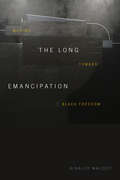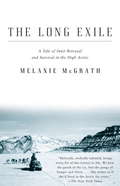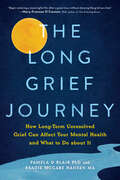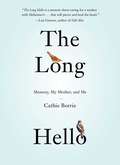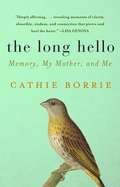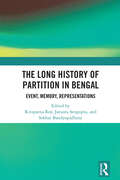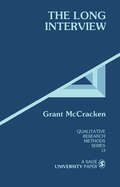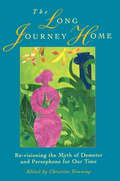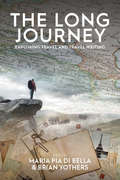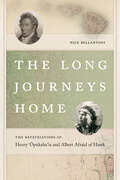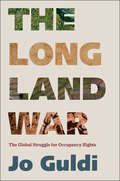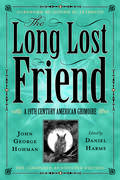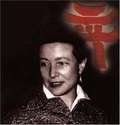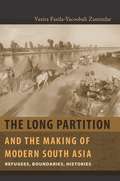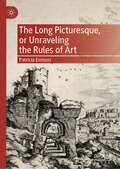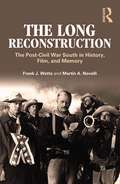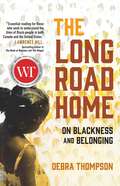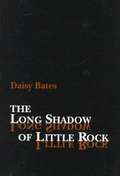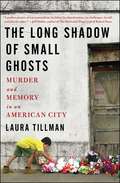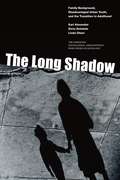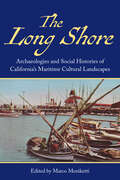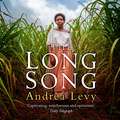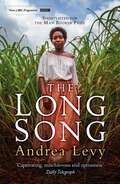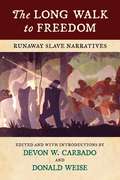- Table View
- List View
The Long Emancipation: Moving toward Black Freedom
by Rinaldo WalcottIn The Long Emancipation Rinaldo Walcott posits that Black people globally live in the time of emancipation and that emancipation is definitely not freedom. Taking examples from across the globe, he argues that wherever Black people have been emancipated from slavery and colonization, a potential freedom has been thwarted. Walcott names this condition the long emancipation—the ongoing interdiction of potential Black freedom and the continuation of the juridical and legislative status of Black nonbeing. Stating that Black people have yet to experience freedom, Walcott shows that being Black in the world is to exist in the time of emancipation in which Black people must constantly fashion alternate conceptions of freedom and reality through expressive culture. Given that Black unfreedom lies at the center of the making of the modern world, the attainment of freedom for Black people, Walcott contends, will transform the human experience worldwide. With The Long Emancipation, Walcott offers a new humanism that begins by acknowledging that present conceptions of what it means to be human do not currently include Black people.
The Long Exile
by Melanie McgrathIn 1952, the Canadian government forcibly relocated three dozen Inuit from their flourishing home on the Hudson Bay to the barren, arctic landscape of Ellesmere Island, the most northerly landmass on the planet. Among this group was Josephie Flaherty, the unrecognized, half-Inuit son of filmmaker Robert Flaherty, director of Nanook of the North. In a narrative rich with human drama, Melanie McGrath follows three generations of the Flaherty family--Robert, Josephie, and Josephie's daughters--to bring this extraordinary tale of deception and harsh deprivation to life.From the Trade Paperback edition.
The Long Exile: A Tale of Inuit Betrayal and Survival in the High Arctic
by Melanie McgrathArriving in the Inuit community of Inukjuak, on the east coast of the Hudson Bay, in 1920, Robert Flaherty set about filming his influential film Nanook of the North. After finishing his filming, Flaherty would leave never to return, but the son he fathered, Josephie Flaherty, would remain behind to suffer with his community as they were forcibly moved hundreds of miles north by the Canadian government some 30 years later, not to receive any form of redress until the mid-1990s. This book both describes the making of the movie and the influence it had on perceptions of the Inuit and the fortunes of Robert Flaherty's Inuit descendants as they coped with exile and hardship. Annotation ©2007 Book News, Inc. , Portland, OR (booknews. com)
The Long Grief Journey: How Long-Term Unresolved Grief Can Affect Your Mental Health and What to Do About It
by Pamela Blair PhD Bradie McCabe Hansen MAAn essential grief guide and recovery workbook for those who have said, "I thought I'd feel better by now."Grief does not follow a timeline or a set path. It is nonlinear and messy, doubling back on itself just when you thought you were out of the woods. Those who have experienced the loss of a loved one know this unequivocally, but Western society still seems to think that grief should only last six months to a year—tops—when in fact, grief can last throughout a person's entire life and manifest as serious mental health issues, including depression, anxiety, anger, and despair.The Long Grief Journey, co-written by a psychotherapist and a clinical psychologist who have both worked with grieving individuals for decades, is for the people who are past the acute pain and effects of a sudden loss and are now learning to live beyond that. It is for those who by all appearances seem to have "moved on." They're working, carrying out their responsibilities, showing up for important life events, yet they quietly bear the weight of their sadness and longing for their loved one. There's a name for this type of long-term, unresolved grief. In fact, there are several: complicated grief, traumatic grief, complex bereavement, prolonged grief, extended grief, abnormal grief, exaggerated grief, and pervasive grief disorder. If you feel "stuck" after experiencing the death of a loved one, even if much time has passed, this book is for you.With exercises, journal prompts, and rituals that will further help readers along their grief path, The Long Grief Journey, co-written by one of the authors of the classic grief book, I Wasn't Ready to Say Goodbye, is designed to educate, support, and coach you to rekindle a desire to live life fully, all while still cherishing and embracing the memories of your loved one.Named one of Choosing Therapy's "14 Best Books on Losing a Parent for 2022."
The Long Hello
by Cathie BorrieA stirring memoir of a daughter caring for a mother with dementia that is sure to become a touchstone for many others.The Long Hello explores the emotional rewards and challenges that Cathie Borrie experienced in caring for her mother, who was living with Alzheimer's disease, for seven years. Between the two, a wondrously poetic dialogue develops, which Ms. Borrie further illuminates with childhood memories of her family, and her struggle to maintain a life outside her caregiving responsibilities. The Long Hello demonstrates how caregiving creates an opportunity to experience the change in a relationship that illness necessitates, one in which joy, meaning, and profound intimacy can flourish.Written in spare, beautiful prose, largely in the form of a dialogue, The Long Hello exquisitely captures the intricacies and nuances of a daughter's relationship with her mother.
The Long Hello: Memory, My Mother, and Me (The\long Hello Ser.)
by Cathie BorrieThe moving memoir of caring for a parent with Alzheimer’s that broke new ground, changed the narrative, and prompted Maya Angelou to exclaim, “Joy!” Since Cathie Borrie delivered her keynote performance at the World Alzheimer’s Day event, her self-published manuscript has won rapturous praise from noted writers and Alzheimer’s experts alike—from Maya Angelou, Lisa Genova, and Molly Peacock to Dr. Bill Thomas, Jed A. Levine of the Alzheimer’s Association, NYC, and Meryl Comer of the Geoffrey Beene Foundation Alzheimer’s Initiative. The Long Hello distills the seven years the author spent caring for her mother into a page-turning account that offers insight into the “altering world of the dementia mind.” During that time, Borrie recorded brief conversations she had with her mother that revealed the transformations within—and sometimes yielded an almost Zen-like poetry. She includes selections from them in chapters about her experience that are as evocative as diary entries. Her mother was the emotional pillar and sometime breadwinner in a home touched by a birth father’s alcoholism, a brother’s early death, divorce, and a stepfather’s remoteness. In Borrie’s spare prose, her mother’s story becomes a family’s story as well a deeply loving portrait that embraces life.
The Long History of Partition in Bengal: Event, Memory, Representations
by Sekhar Bandyopadhyay Rituparna Roy Jayanta SenguptaThis book focuses on the aftermath of the 1947 Partition of India. It considers the long aftermath and afterlives of Partition afresh, from a wide and inclusive range of perspectives and studies the specificities of the history of violence and migration and their memories in the Bengal region. The chapters in the volume range from the administrative consequences of partition to public policies on refugee settlement, life stories of refugees in camps and colonies, and literary and celluloid representations of Partition. It also probes questions of memory, identity, and the memorialization of events. Eclectic in its theoretical orientation and methodology, this book will be of interest to scholars and researchers of partition history, colonialism, refugee studies, Indian history, South Asian history, migration studies, and modern history in general.
The Long Interview
by Dr Grant MccrackenThe Long Interview provides a systematic guide to the theory and methods of the long qualitative interview or intensive interviewing. It gives a clear explanation of one of the most powerful tools of the qualitative researcher. The volume begins with a general overview of the character and purpose of qualitative inquiry and a review of key issues. The author outlines the four steps of the long qualitative interview and how to judge quality. He then offers practical advice for those who commission and administer this research, including sample questionnaires and budgets to help readers design their own. The author introduces key theoretical and methodological issues, various research strategies, and a simple four-stage model of inquiry, from the design of an open-ended questionnaire to the write up of results.
The Long Journey Home: Revisioning the Myth of Demeter and Persephone for Our Time
by Christine DowningThe story of the mother-and-daughter goddesses Demeter and Persephone has seized the imagination of people in every age, from ancient times to the present. Considered today by many to be the archetypal myth for women, it touches on timeless themes in every life, such as the male-female relationship, love between women, initiations into puberty and old age, the mother-daughter bond, death, and ecological renewal. Christine Downing has combined essays, prose, poetry, and even performance art with her own insightful commentary to shed new light on the myth's ancient meanings and to offer new insights in its implications for contemporary men and women.
The Long Journey: Exploring Travel and Travel Writing
by Maria Pia Di Bella and Brian YothersTravel writing has, for centuries, composed an essential historical record and wide-ranging literary form, reflecting the rich diversity of travel as a social and cultural practice, metaphorical process, and driver of globalization. This interdisciplinary volume brings together anthropologists, literary scholars, social historians, and other scholars to illuminate travel writing in all its forms. With studies ranging from colonial adventurism to the legacies of the Holocaust, The Long Journey offers a unique dual focus on experience and genre as it applies to three key realms: memory and trauma, confrontations with the Other, and the cultivation of cultural perspective.
The Long Journeys Home: The Repatriations of Henry ‘Opukaha‘ia and Albert Afraid of Hawk (The Driftless Connecticut Series)
by Nick BellantoniHenry ‘Opukaha‘ia (ca. 1792–1818), Native Hawaiian, and Itankusun Wanbli (ca. 1879–1900), Oglala Lakota, lived almost a century apart. Yet the cultural circumstances that led them to leave their homelands and eventually die in Connecticut have striking similarities. <P>‘Opukaha‘ia was orphaned during the turmoil caused in part by Kamehameha’s wars in Hawai’i and found passage on a ship to New England, where he was introduced and converted to Christianity, becoming the inspiration behind the first Christian missions to Hawai’i. Itankusun Wanbli, Christianized as Albert Afraid of Hawk, performed in Buffalo Bill’s “Wild West” as a way to make a living after his traditional means of sustenance were impacted by American expansionism. <P><P>Both young men died while on their “journeys” to find fulfillment and both were buried in Connecticut cemeteries. In 1992 and 2008, descendant women had callings that their ancestors “wanted to come home” and began the repatriation process of their physical remains. <P><P>CT state archaeologist Nick Bellantoni oversaw the archaeological disinterment, forensic identifications and return of their skeletal remains back to their Native communities and families. The Long Journeys Home chronicles these important stories as examples of the wide-reaching impact of American imperialism and colonialism on Indigenous Hawaiian and Lakota traditions and their cultural resurgences, in which the repatriation of these young men have played significant roles. <P><P>Bellantoni’s excavations, his interaction with two Native families and his participation in their repatriations have given him unique insights into the importance of heritage and family among contemporary Native communities and their common ground with archaeologists. His natural storytelling abilities allow him to share these meaningful stories with a larger general audience.
The Long Land War: The Global Struggle for Occupancy Rights (Yale Agrarian Studies Series)
by Jo GuldiA definitive history of ideas about land redistribution, allied political movements, and their varied consequences around the world &“An epic work of breathtaking scope and moral power, The Long Land War offers the definitive account of the rise and fall of land rights around the world over the last 150 years.&” —Matthew Desmond, Pulitzer Prize–winning author of Evicted: Poverty and Profit in the American City Jo Guldi tells the story of a global struggle to bring food, water, and shelter to all. Land is shown to be a central motor of politics in the twentieth century: the basis of movements for giving reparations to formerly colonized people, protests to limit the rent paid by urban tenants, intellectual battles among development analysts, and the capture of land by squatters taking matters into their own hands. The book describes the results of state-engineered &“land reform&” policies beginning in Ireland in 1881 until U.S.-led interests and the World Bank effectively killed them off in 1974. The Long Land War provides a definitive narrative of land redistribution alongside an unflinching critique of its failures, set against the background of the rise and fall of nationalism, communism, internationalism, information technology, and free-market economics. In considering how we could make the earth livable for all, she works out the important relationship between property ownership and justice on a changing planet.
The Long Lost Friend: A 19th Century American Grimoire
by John George HohmanYou are holding in your hands the most famous book of magic written in AmericaOriginally published in 1820 near Reading, Pennsylvania, under the German title Der Lange Verborgene Freund, this text is the work of immigrant Johann George Hohman. A collection of herbal formulas and magical prayers, The Long-Lost Friend draws from the traditional folk magic of Pennsylvania Dutch customs and pow-wow healers.This is authentic American folk magic at its best—household remedies combined with charms and incantations to cure common ailments and settle rural troubles. The most well-known grimoire of the New World, this work has influenced the practices of hoodoo, Santeria, Paganism, and other faiths. In this, the definitive edition, you'll find:Both the original German text and the 1856 English translationMore than one hundred additional charms and recipes, taken from the pirated 1837 Skippacksville edition and othersExtensive notes on the recipes, magic, Pennsylvania Dutch customs, and the origin of many of the charmsIndices for general purposes and ingredientsExplanations of the specialized terminology of illnessesWhether your interest lies in folklore, ethnobotany, magic, witchcraft, or American history, this classic volume is an essential addition to your library.
The Long March: An Account of Modern China
by Simone De Beauvoir Austryn WainhouseAuthor of "The Second Sex", and one of the 20th century's most brilliant writers, Simone de Beauvoir turns her attention eastward to China and paints a masterly picture of that nation in modern times. Honest and detailed, it comes from de Beauvoir's personal journey through the country: "I have tried to evaluate all the knowledge gained at first-hand, by actually seeing places and talking with people", she said, poignantly, noting how the Chinese "are fighting hard to build a human world".
The Long Partition and the Making of Modern South Asia: Refugees, Boundaries, Histories (Cultures of History)
by Vazira Fazila-Yacoobali ZamindarNation-states often shape the boundaries of historical enquiry, and thus silence the very histories that have sutured nations to territorial states. "India" and "Pakistan" were drawn onto maps in the midst of Partition's genocidal violence and one of the largest displacements of people in the twentieth century. Yet this historical specificity of decolonization on the very making of a nationalized cartography of modern South Asia has largely gone unexamined. In this remarkable study based on more than two years of ethnographic and archival research, Vazira Fazila-Yacoobali Zamindar argues that the combined interventions of the two postcolonial states were enormously important in shaping these massive displacements. She examines the long, contentious, and ambivalent process of drawing political boundaries and making distinct nation-states in the midst of this historic chaos.Zamindar crosses political and conceptual boundaries to bring together oral histories with north Indian Muslim families divided between the two cities of Delhi and Karachi with extensive archival research in previously unexamined Urdu newspapers and government records of India and Pakistan. She juxtaposes the experiences of ordinary people against the bureaucratic interventions of both postcolonial states to manage and control refugees and administer refugee property. As a result, she reveals the surprising history of the making of the western Indo-Pak border, one of the most highly surveillanced in the world, which came to be instituted in response to this refugee crisis, in order to construct national difference where it was the most blurred.In particular, Zamindar examines the "Muslim question" at the heart of Partition. From the margins and silences of national histories, she draws out the resistance, bewilderment, and marginalization of north Indian Muslims as they came to be pushed out and divided by both emergent nation-states. It is here that Zamindar asks us to stretch our understanding of "Partition violence" to include this long, and in some sense ongoing, bureaucratic violence of postcolonial nationhood, and to place Partition at the heart of a twentieth century of border-making and nation-state formation.
The Long Picturesque, or Unraveling the Rules of Art
by Patricia EmisonThis book provides a Renaissance art historian’s view of how the picturesque aesthetic developed from roots in the sixteenth century (mostly in painting, but with ramifications for printmaking, landscape design, and architecture), and further, how the picturesque aesthetic fundamentally changed the relationship between art and nature, between viewer and image. The book's argument is based on wide reading of obscure yet piquant critical texts, mostly of the seventeenth and eighteenth centuries, together with consideration of varied works of art, ranging from Fra Angelico to Raphael and Michelangelo, and from Rubens to Canaletto, and from James Gibbs to Jacques Demy, all of them studied not for their place in the history of style, but for their spatial imagination.
The Long Reconstruction: The Post-Civil War South in History, Film, and Memory
by Frank J. Wetta Martin A. NovelliA century and a half after the Civil War, Americans are still dealing with the legacies of the conflict and Reconstruction, including the many myths and legends spawned by these events. The Long Reconstruction: The Post-Civil War South in History, Film, and Memory brings together history and popular culture to explore how the events of this era have been remembered. Looking at popular cinema across the last hundred years, The Long Reconstruction uncovers central themes in the history of Reconstruction, including violence and terrorism; the experiences of African Americans and those of women and children; the Lost Cause ideology; and the economic reconstruction of the American South. Analyzing influential films such as The Birth of a Nation and Gone with the Wind, as well as more recent efforts such as Cold Mountain and Lincoln, the authors show how the myths surrounding Reconstruction have impacted American culture. This engaging book is essential reading for anyone interested in the history of Reconstruction, historical memory, and popular culture.
The Long Road Home: On Blackness and Belonging
by Debra ThompsonFrom a leading scholar on the politics of race comes a work of family history, memoir, and insight gained from a unique journey across the continent, on what it is to be Black in North America.When Debra Thompson moved to the United States in 2010, she felt like she was returning to the land of her ancestors, those who had escaped to Canada via the Underground Railroad. But her decade-long journey across Canada and the US transformed her relationship to both countries, and to the very idea of home. In The Long Road Home, Thompson follows the roots of Black identities in North America and the routes taken by those who have crisscrossed the world&’s longest undefended border in search of freedom and belonging. She begins in Shrewsbury, Ontario, one of the termini of the Underground Railroad and the place where members of her own family found freedom. More than a century later, Thompson still feels the echoes and intergenerational trauma of North American slavery. She was often the Only One—the only Black person in so many white spaces—in a country that perpetuates the national mythology of multiculturalism. Then she revisits her four American homes, each of which reveals something peculiar about the relationship between American racism and democracy: Boston, Massachusetts, the birthplace of the American Revolution; Athens, Ohio, where the white working class and the white liberal meet; Chicago, Illinois, the great Black metropolis; and Eugene, Oregon, the western frontier. She then moves across the border and settles in Montreal, a unique city with a long history of transnational Black activism, but one that does not easily accept the unfamiliar and the foreign into the fold. The Long Road Home is a moving personal story and a vital examination of the nuances of racism in the United States and Canada. Above all, it is about the power of freedom and the dreams that link and inspire Black people across borders from the perspective of one who has deep ties to, critiques of, and hope for both countries.
The Long Shadow Of Little Rock
by Daisy BatesFor many Americans, until recently, knowledge about Arkansas has been limited to one of the state's moments of ignominy: the Central High School desegregation crisis in Little Rock in 1957. In this memoir, Daisy Bates recounts the conflict as only a journalist hardened and polished by years of struggle in the civil rights movement could tell it.
The Long Shadow of Small Ghosts: Murder and Memory in an American City
by Laura TillmanIn Cold Blood meets Adrian Nicole LeBlanc's Random Family: A harrowing, profoundly personal investigation of the causes, effects, and communal toll of a deeply troubling crime--the brutal murder of three young children by their parents in the border city of Brownsville, Texas.On March 11, 2003, in Brownsville, Texas--one of America's poorest cities--John Allen Rubio and Angela Camacho murdered their three young children. The apartment building in which the brutal crimes took place was already rundown, and in their aftermath a consensus developed in the community that it should be destroyed. It was a place, neighbors felt, that was plagued by spiritual cancer. In 2008, journalist Laura Tillman covered the story for The Brownsville Herald. The questions it raised haunted her, particularly one asked by the sole member of the city's Heritage Council to oppose demolition: is there any such thing as an evil building? Her investigation took her far beyond that question, revealing the nature of the toll that the crime exacted on a city already wracked with poverty. It sprawled into a six-year inquiry into the larger significance of such acts, ones so difficult to imagine or explain that their perpetrators are often dismissed as monsters alien to humanity. With meticulous attention and stunning compassion, Tillman surveyed those surrounding the crimes, speaking with the lawyers who tried the case, the family's neighbors and relatives and teachers, even one of the murderers: John Allen Rubio himself, whom she corresponded with for years and ultimately met in person. The result is a brilliant exploration of some of our age's most important social issues, from poverty to mental illness to the death penalty, and a beautiful, profound meditation on the truly human forces that drive them. It is disturbing, insightful, and mesmerizing in equal measure.
The Long Shadow: Family Background, Disadvantaged Urban Youth, and the Transition to Adulthood
by Doris Entwisle Karl Alexander Linda OlsonA volume in the American Sociological Association's Rose Series in Sociology West Baltimore stands out in the popular imagination as the quintessential “inner city”—gritty, run-down, and marred by drugs and gang violence. Indeed, with the collapse of manufacturing jobs in the 1970s, the area experienced a rapid onset of poverty and high unemployment, with few public resources available to alleviate economic distress. But in stark contrast to the image of a perpetual “urban underclass” depicted in television by shows like The Wire, sociologists Karl Alexander, Doris Entwisle, and Linda Olson present a more nuanced portrait of Baltimore’s inner city residents that employs important new research on the significance of early-life opportunities available to low-income populations. The Long Shadow focuses on children who grew up in west Baltimore neighborhoods and others like them throughout the city, tracing how their early lives in the inner city have affected their long-term well-being. Although research for this book was conducted in Baltimore, that city’s struggles with deindustrialization, white flight, and concentrated poverty were characteristic of most East Coast and Midwest manufacturing cities. The experience of Baltimore’s children who came of age during this era is mirrored in the experiences of urban children across the nation. For 25 years, the authors of The Long Shadow tracked the life progress of a group of almost 800 predominantly low-income Baltimore school children through the Beginning School Study Youth Panel (BSSYP). The study monitored the children’s transitions to young adulthood with special attention to how opportunities available to them as early as first grade shaped their socioeconomic status as adults. The authors’ fine-grained analysis confirms that the children who lived in more cohesive neighborhoods, had stronger families, and attended better schools tended to maintain a higher economic status later in life. As young adults, they held higher-income jobs and had achieved more personal milestones (such as marriage) than their lower-status counterparts. Differences in race and gender further stratified life opportunities for the Baltimore children. As one of the first studies to closely examine the outcomes of inner-city whites in addition to African Americans, data from the BSSYP shows that by adulthood, white men of lower status family background, despite attaining less education on average, were more likely to be employed than any other group in part due to family connections and long-standing racial biases in Baltimore’s industrial economy. Gender imbalances were also evident: the women, who were more likely to be working in low-wage service and clerical jobs, earned less than men. African American women were doubly disadvantaged insofar as they were less likely to be in a stable relationship than white women, and therefore less likely to benefit from a second income. Combining original interviews with Baltimore families, teachers, and other community members with the empirical data gathered from the authors’ groundbreaking research, The Long Shadow unravels the complex connections between socioeconomic origins and socioeconomic destinations to reveal a startling and much-needed examination of who succeeds and why.
The Long Shore: Archaeologies and Social Histories of Californias Maritime Cultural Landscapes
by Marco MenikettiThe archaeology of maritime cultural landscapes offers insights into cultural traditions, social transitions, and cultural relationships that reach beyond the narrow confines of waterfronts and beach strands and helps construct meaningful social histories. The long shore of California is not limited to the land that borders the Pacific Ocean, but includes the navigable waters that reach inland, the off-shore islands, and the riverways flow to the sea. Authors investigate the multifaceted character of maritime landscapes and maritime oriented communities in California’s equally diverse cultural landscape; viewed through an archaeological lens, and emphasizing social behavior and community as material culture in order to reveal intersections and commonalities.
The Long Song: Now A Major BBC Drama
by Andrea LevySoon to be a major BBC drama starring Tamara Lawrance, Hayley Atwell and Lenny Henry, and shortlisted for the Man Booker prize, The Long Song is a hauntingly beautiful, heartbreaking and unputdownable novel, for those who loved Homegoing, The Underground Railroad, or the film 12 Years a Slave.'A marvel of luminous storytelling' Financial TimesYou do not know me yet. My son Thomas, who is publishing this book, tells me, it is customary at this place in a novel to give the reader a little taste of the story that is held within these pages. As your storyteller, I am to convey that this tale is set in Jamaica during the last turbulent years of slavery and the early years of freedom that followed.July is a slave girl who lives upon a sugar plantation named Amity and it is her life that is the subject of this tale. She was there when the Baptist War raged in 1831, and she was present when slavery was declared no more. My son says I must convey how the story tells also of July's mama Kitty, of the negroes that worked the plantation land, of Caroline Mortimer the white woman who owned the plantation and many more persons besides - far too many for me to list here. But what befalls them all is carefully chronicled upon these pages for you to peruse.Perhaps, my son suggests, I might write that it is a thrilling journey through that time in the company of people who lived it. All this he wishes me to pen so the reader can decide if this is a novel they might care to consider. Cha, I tell my son, what fuss-fuss. Come, let them just read it for themselves.(P)2011 Headline Publishing Group Ltd
The Long Song: Shortlisted for the Booker Prize (Nhb Modern Plays Ser.)
by Andrea LevyNow a major BBC TV drama, starring Tamara Lawrance, Lenny Henry and Hayley Atwell.A Sunday Times bestseller (2011), shortlisted for the Man Booker Prize, The Long Song by Andrea Levy is a hauntingly beautiful, heartbreaking and unputdownable novel of the last days of slavery in Jamaica, for those who loved Homegoing, The Underground Railroad, or the film 12 Years a Slave.'A marvel of luminous storytelling' Financial TimesYou do not know me yet. My son Thomas, who is publishing this book, tells me, it is customary at this place in a novel to give the reader a little taste of the story that is held within these pages. As your storyteller, I am to convey that this tale is set in Jamaica during the last turbulent years of slavery and the early years of freedom that followed.July is a slave girl who lives upon a sugar plantation named Amity and it is her life that is the subject of this tale. She was there when the Baptist War raged in 1831, and she was present when slavery was declared no more. My son says I must convey how the story tells also of July's mama Kitty, of the negroes that worked the plantation land, of Caroline Mortimer the white woman who owned the plantation and many more persons besides - far too many for me to list here. But what befalls them all is carefully chronicled upon these pages for you to peruse.Perhaps, my son suggests, I might write that it is a thrilling journey through that time in the company of people who lived it. All this he wishes me to pen so the reader can decide if this is a novel they might care to consider. Cha, I tell my son, what fuss-fuss. Come, let them just read it for themselves.
The Long Walk to Freedom: Runaway Slave Narratives
by Donald Weise Devon W. CarbadoIn this groundbreaking compilation of first-person accounts of the runaway slave phenomenon, editors Devon Carbado and Donald Weise have recovered twelve narratives spanning eight decades--more than half of which have been long out of print. Told in the voices of the runaway slaves themselves, these narratives reveal the extraordinary and often innovative ways that these men and women sought freedom and demanded citizenship.
